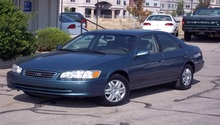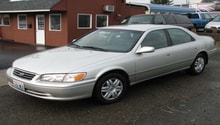Toyota Camry: How to Maximize MPG
Gas mileage is a numbers game. Learn which everyday tricks you can do to keep your fuel costs down and your miles per gallon up.
This article applies to the Toyota Camry (1997-2011).
If you are like most Camry owners, you want to maximize your car's gas mileage whenever possible. Being mindful of your car's condition, following your regular maintenance schedule and steering clear of certain traffic situations are the best ways to keep your car running longer between trips to the gas station. Read on to learn how to achieve the best gas mileage out of your Toyota Camry.

Materials Needed
- Engine oil and filter
- Transmission oil
- Spark plugs
- Fuel system cleaner
- On-board diagnostic tool
Step 1 – Check your tire pressure
This is the cheapest, easiest and fastest way to maximize your Camry' fuel economy. While you might be tempted to add extra pressure to your tires to compensate for the loss in pressure that will gradually occur as you drive your Camry, it's recommended that you don't. Adding too much or too little air pressure can decrease gas mileage, especially as seasonal and weather changes further alter the amount of pressure in your tires. Simply add the correct amount of air pressure to your tires that is needed, and then check your tires regularly. Doing so will ensure you achieve the best gas mileage possible for your Camry.

Pro Tip
Check your tires for uneven wear, and replace tires that are badly worn.
Step 2 – Replace your fluids regularly
Replace your engine oil (and filter) as well as your transmission fluid within regularly scheduled intervals. For engine oil this should be every 5,000 miles, while for transmission fluid this should be every 30,000 miles. Dirty transmission fluid increases the amount of resistance that your tires have to work against; thereby hitting your gas mileage pretty hard and sending you back to the pump more frequently. While not involving a fluid, it's recommended that you change your spark plugs every 40,000 miles, nonetheless.

Pro Tip
It's recommended that you use a high-quality synthetic engine oil, such as Castrol or Mobile Oil. If after following your regular maintenance schedule you still notice a decline in gas mileage, check your trouble codes or visit a local Toyota dealership for professional assistance. If your sensors are bad, your check engine light will display on your dashboard. As well, your Camry will provide the appropriate trouble code(s) via an on-board diagnostic tool.
Step 3 – Clean your fuel system at your next fill-up
Add in a fuel system cleaner within your next fill-up; make sure you start with a nearly empty tank of fuel.
- Add 12 gallons of fuel for a 12-ounce bottle of Techron fuel system cleaner.
- Use this ratio when adding more fuel.
- Your tank capacity is 18.5 gallons, so if you fill up all the way, you'll need another half bottle.
Step 4 – Steer clear of stop-and-go traffic
Described as a "gas killer" by most, stop and go traffic is the single-most worst practice you can continue as a driver. If you find yourself in stop-and-go traffic, search for an alternative route or head to a local highway, where fuel economy is much higher in general.

How to Maximize MPG
Related Discussion
- How Do I Increase Gas Mileage on My Toyota Camry? - Camryforums.com






